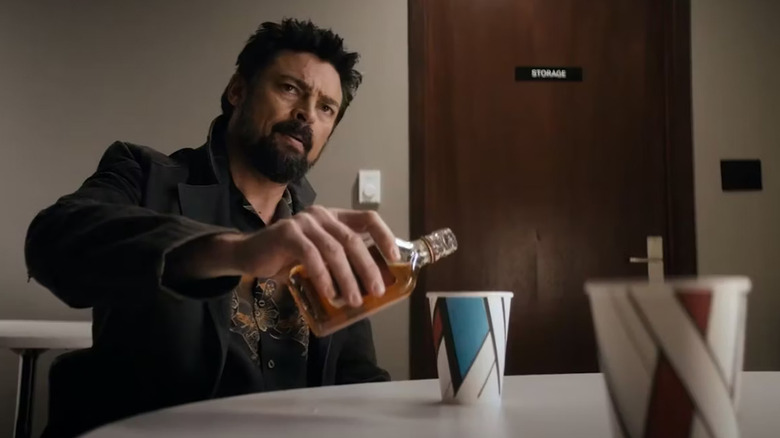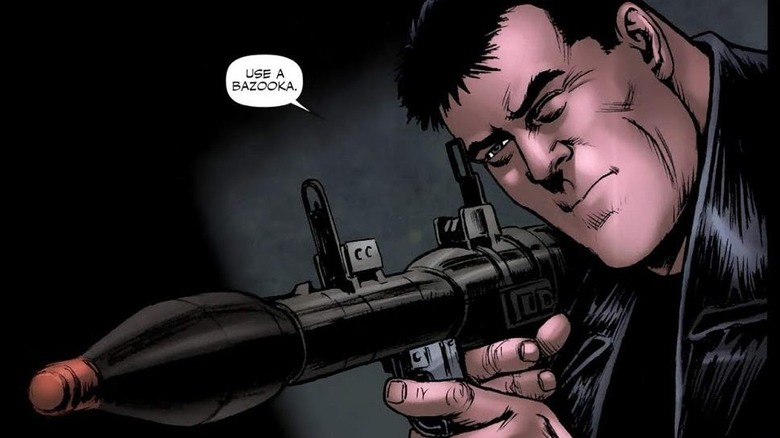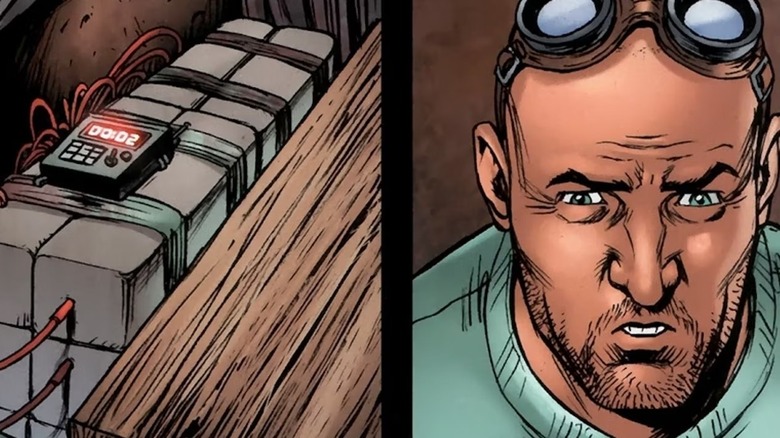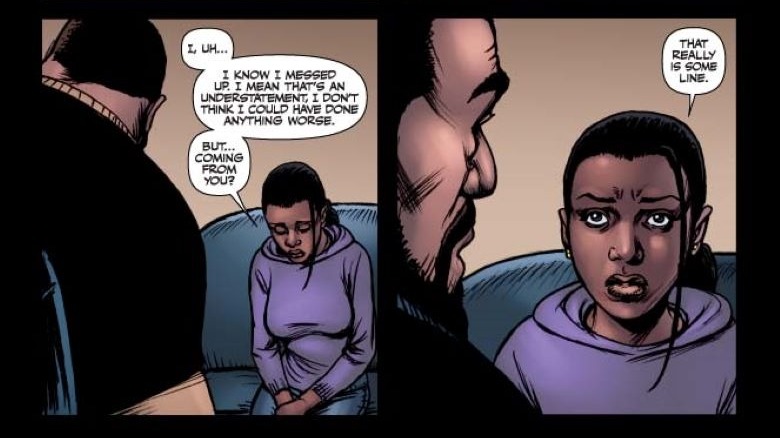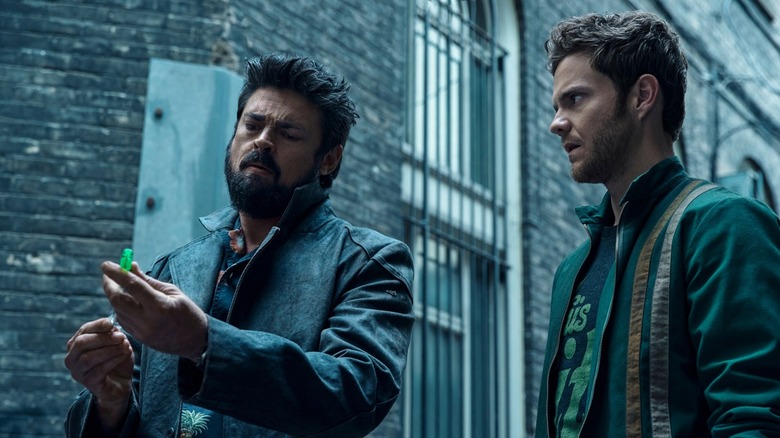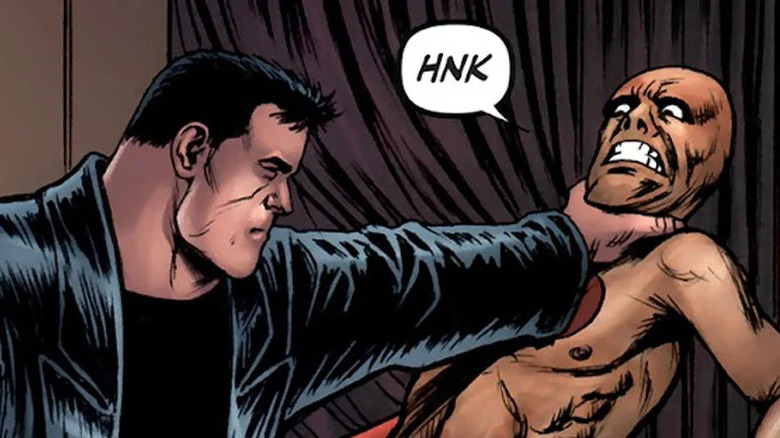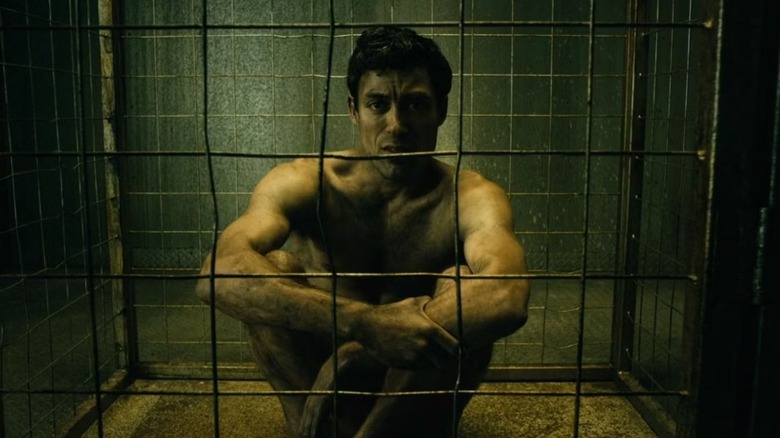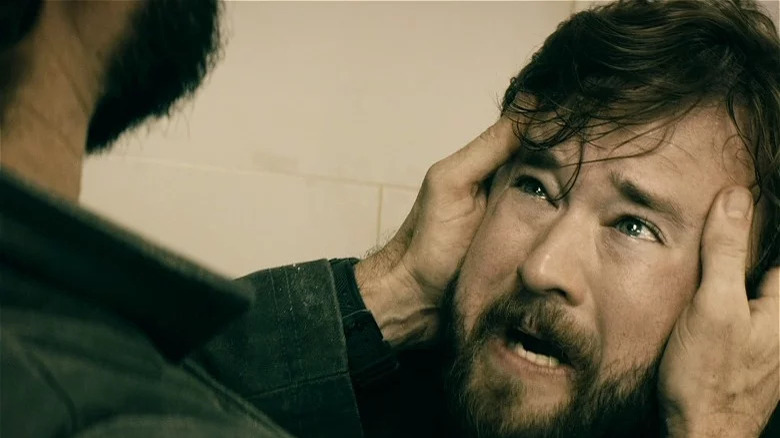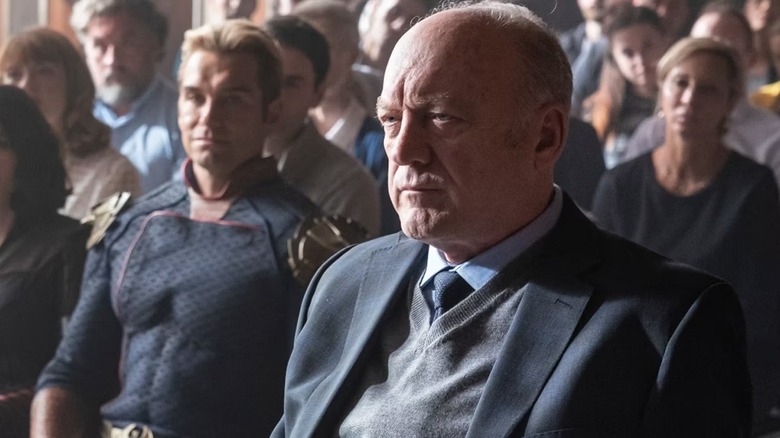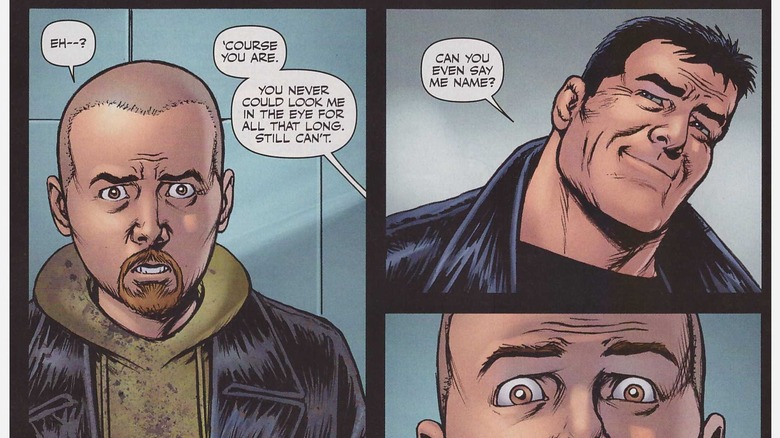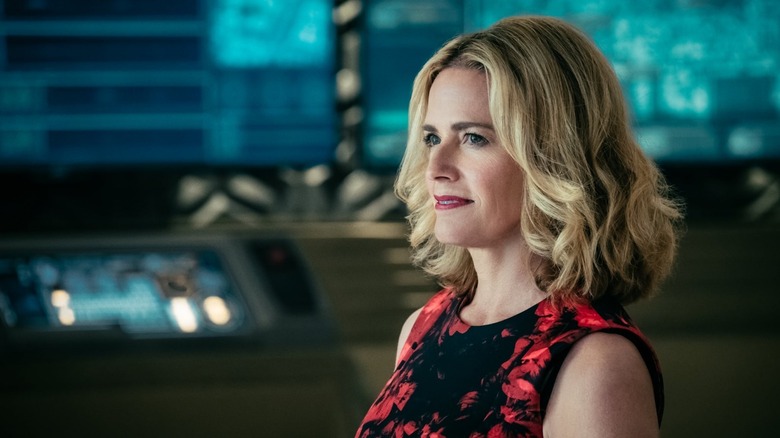The Worst Things Billy Butcher Has Ever Done In 'The Boys'
When putting together an anti-superhero crew in a world full of superheroes, "The Boys" creators Garth Ennis and Darick Robertson introduced Billy Butcher — a character almost as deplorable as the supes he fights against. Across 72 issues, Ennis and Robertson put their lead anti-hero in tense situations that rendered morally bankrupt decisions, ending in an all-knowing Billy Butcher smile.
While Karl Urban take on Billy Butcher in the Prime Video streaming series adaptation doesn't go quite as hard as the comics, the darkness of the character remains. His mission to wipe out the evil superheroes of the world continues to be a noble and understandable venture, but arguably, the ends rarely justify the means Butcher employs.
Season 3 of "The Boys" left Butcher with a terminal diagnosis, and therefore, a set deadline to complete his life's pursuit. Karl Urban has expressed his desire of where he wants Billy Butcher to go in season 4, and if the comics are any indicator, we're all in for a deranged ride. Ahead of the upcoming season 4 premiere of "The Boys" on June 13, let's revisit some of Billy Butcher's worst moments on "The Boys" — on screen and in comics.
Turning against (and killing) Love Sausage
In the comics, the Boys do indeed take down Homelander, cutting off the proverbial and literal head of Vought and everything wrong with superheroes. But for Butcher, Homelander isn't the end game — he won't rest until he's killed all the supes of the world. In order to accomplish this, Butcher needs to take down anyone and everyone who could possibly stand in his way, and that includes allies and friends.
In "The Boys #66," Butcher deems Love Sausage to be one of these obstacles. A Russian superhero who helped the Boys take down Little Nina, Love Sausage and Butcher have broken bread and shared pints, but none of that matters to Butcher. The fact that Love Sausage represents even a minor hindrance to Butcher's plans is enough to justify firing at him three times with a bazooka, resulting in a painful, drawn out death. All's fair in their line of work, however, seeing Butcher so coldly turn against someone who he seemingly liked and respected sends a chill down our spine.
Killing his own team
Love Sausage turned out to just be the tip of the iceberg for Butcher. Two issues later, we see Butcher starting to pick off his teammates starting with setting off a bomb at the Boys' headquarters, unceremoniously killing the Female and Frenchie. He later confronts Mother's Milk, killing him with a grenade and ruthlessly informing him that Butcher had MM's mother set as an intended target. Butcher attempts to lessen his brutality when informing Hughie of all these deaths, saying he didn't want them to die, but it's clear that Butcher's methods left little recourse for the Female, Frenchie, and MM to survive.
Killing Love Sausage already felt like a calculated betrayal on Butcher's part, but to pick off his team, who have literally been his ride or dies through the worst of this journey, exemplifies his true nature. There's a callousness to Butcher that even Homelander never exhibited. At least everyone in Homelander's life knew where they stood — with Butcher, friendship and fighting side by side mean nothing. As the saying goes: better the devil you know.
Murdering Mother's Milk ex in front of their daughter
Before Butcher ended Mother's Milk's life, he paid a visit to MM's ex-wife, Monique, and daughter, Janine. Evidently stemming from Butcher taking issue with MM's brief pause in the mission to save Janine, "The Boys #67" finds Butcher confronting Monique, believing her to be the "problem." Horrifyingly, Butcher kills Monique right in front of Janine, and to make matters worse, he implies to the 12-year-old that her father was behind it.
"The Boys" broke ground as a showcase for what could happen if the worst of us became superheroes. Butcher thought he lived on a moral high ground above the supes, but as "The Boys" unfolded, the fact that Billy Butcher has no line to cross became apparent. Not only did Butcher actively engage in reprehensible behavior like the supes, his killing of Monique in front of Janine demonstrates how relentlessly vicious he could be, while his implication to Janine that MM was responsible for her mom's death simply proves his cruelty.
Manipulating innocent Hughie into becoming a murderer
In both the comics and the show, Hughie (played by Jack Quaid, who had his own reasons for being afraid of Karl Urban) begins as the innocent soul of the series who becomes suitably traumatized after his girlfriend is eviscerated by A-Train before his eyes (directly in the show and indirectly in the comics). Having been left standing on the street holding her severed hands, Hughie becomes an easy recruit and target for Butcher. Throughout "The Boys," we see Butcher unravel Hughie piece by piece, manipulating him into becoming as duplicitous as Butcher and eventually committing murder (albeit apprehensively and with remorse).
Butcher does a lot of terrible things on his crusade to rid the world of supes, and although corrupting a pure mind such as Hughie's may seem less severe, it gets to the heart of what makes Butcher such a dangerous character: his noble intentions come at a great cost to those around him with little concern.
Torturing Jack from Jupiter for killing his dog
Three years before John Wick rained hell down on the Russian mafia for killing his dog, Billy Butcher brought down his iron fist on Jack from Jupiter for doing the same. In "The Boys #59," Butcher not only captures Jack, but he tortures him in a protracted and inhuman manner. Showing absolutely no mercy to Jack, Butcher establishes the lengths he'll go to exact pain on those who cross him, both mentally and physically.
By this point in the series, Butcher's amoral conduct doesn't come as a surprise, but the way in which he carefully and savagely kills Jack takes things to a whole other level. Across the entire series, no other character displays such sadistic ways — not even Homelander. Billy Butcher may not be the most powerful character in "The Boys," but he can certainly go toe to toe with any of them in terms of the disturbing destruction he causes.
Kidnaps and experiments on Translucent
Our introduction to Billy Butcher in season 1 of the Prime Video series begins on a raucous note when he incapacitates Translucent (Alex Hassell) after the supe confronts Hughie. Although seemingly nothing can penetrate Translucent's skin, this doesn't stop Butcher and Frenchie from keeping him caged up to conduct experiments on him in an attempt to figure out what will kill him and how. Across two episodes, we see the Boys try (and fail) to hurt Translucent, completely unbothered by the torturous nature of their testing.
Eventually they discover that placing C-4 explosives inside of Translucent should do the trick, so Frenchie loads up Translucent's colon with some firepower, and Hughie (of all people) eventually pulls the trigger. To be clear, Translucent's a real piece of work and deserved what was coming to him, but even still, surely the supes are still owed some degree of humanity. Nevertheless, Amazon starting "The Boys" off with some Hague crime vibes feels fitting for a show that will test the mettle of the strongest stomachs out there.
Brutally killing Mesmer
Watching Butcher calmly pace towards a frantic Mesmer (Hayley Joel Osment) in episode 7 of season 1, "The Self-Preservation Society," begins one of Billy Butcher's worst best moments on "The Boys." After Mesmer betrays the Boys and exposes their identities to Homelander (Anthony Starr), Butcher seeks vengeance the only way he knows how. In a desperate attempt to evade Butcher in a busy train station, Mesmer hides in a toilet stall for naught. Butcher finds him and with only a few words exchanged, he caves in Mesmer's head with the help of the washroom sink.
It's not just that Mesmer's murder is horribly violent, it's the faint glimmer of hope Butcher allows. As Mesmer gallantly offers Butcher information about his wife's whereabouts, Butcher gently cradles Mesmer's head in his hands. For a brief, yet significant, moment, the telepath thinks he'll be spared — that is until he sees his fate. In a split second, he goes from hopeful to missing half his head, literally.
Enslaving Jonah Vogelbaum
Kidnapping and torturing become established parts of Butcher's catalogue, and now we can add enslavement. When Col. Greg Mallory, the creator of the Boys, orders Butcher to kill Jonah Vogelbaum, Butcher takes it a step further. Rather than follow Mallory's directive to eliminate the inventor of Compound V, Butcher decides to keep Vogelbaum alive and forces him to work on a solution to exterminate anyone with Compound V in their system. Vogelbaum remains Butcher's prisoner for years working while the world thinks he died long ago. Of course, after Vogelbaum creates a solution, Butcher offs him without much of a second thought.
In the Prime Video series, Butcher handles Vogelbaum (John Doman) with a lot more tact, although the end result remains the same. Regardless, it's within Butcher's DNA to hunt, kidnap, torture, and evidently, forcibly imprison those who wronged him or who can be of use to him. Worst of all, Butcher never seems at all remorseful for his actions, even when it comes to keeping an elderly man captive for years on end.
Planning on exterminating everyone with even a trace of Compound V
Thanks to Vogelbaum, Butcher has the ability to accomplish his all-consuming goal of eradicating the world from superheroes. Hughie, being the typical sound mind of the operation, warns Butcher that by deploying this solution, anyone with even a hint of Compound V in their system will be effected. Although Compound V becomes an even more dangerous drug beyond "The Boys," the risk certainly doesn't justify the idea of killing innocent people around the world, including children.
Throughout "The Boys," Butcher's hatred for supes clouds his judgment, a fact he's very aware of and willingly ignores. We also see Homelander and his supes commit heinous crimes and parade around their superpowers with little consequence, but what separates Butcher from them is his awareness of right from wrong, something Homelander rarely displays, if ever. Butcher has a moral compass, he just never uses it. Instead, he'll commit genocide while reasoning that such an atrocity will be justifiable as long as the world becomes free from those he deems dangerous.
Showing little regard to blowing up a baby
Speaking of killing innocent children without remorse, the Prime Video season 1 finale, "You Found Me," sees Butcher in a particularly unsettling situation. In an attempt to lure Homelander, Butcher outfits Madelyn Stillwell (Elisabeth Shue), an executive at Vought and Homelander's lover, with a bomb vest. Not realizing Homelander's newly found contempt of Madelyn for keeping secrets from him, Homelander thwarts Butcher's plan when he murders Madelyn by casually frying her face with his laser eyes as Butcher looks on.
Throughout this ordeal we can hear the cries of Madelyn's baby ringing through the house. At one point, Madelyn even tries to reason with Homelander to take her child upstairs away from the violence. Her pleas are left unmet, and when the bomb is triggered, it's safe to assume that the explosion killed the infant. To be fair to Butcher, we never see him personally set off the bomb. However, he knew it would be going off and he, like us viewers, heard the innocent cries of a helpless baby. Butcher doesn't attempt to make a play to shove the baby off into safety — rather, a smug smile creeps onto his face when he hears detonation commencing.
